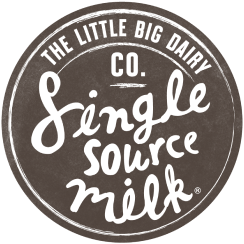Cows' milk is intended to sustain a young calf in the first few months of its life and help it to develop. Because of this, it contains all the vitamins and minerals that young calves need, and these are also extremely beneficial for humans. Milk is, in fact, one of the most nutritious drinks available.
Some people, especially young people, can suffer from milk allergy, while others may be lactose intolerant and so cannot drink normal cows' milk. For those with lactose intolerance, lactose-free milk options are available that maintain all the nutritional benefits. With other allergies possible, it's best to know what your milk contains.

Understanding Food Labels
Food Standards Australia and New Zealand requires that all food products must have a comprehensive information label, which applies to milk and dairy products. This label shows:
- Nutrition panel that indicates the amount of energy, protein, fat, carbohydrate, and sodium, expressed as either per typical serving or per 100 grams. Carbohydrate includes sugar, which for milk means lactose.
- The percentage of each main ingredient.
- An accurate description of the product, supplier details, and batch and lot references.
- Allergy information, including nuts, crustaceans, fish, sesame, soybeans, eggs, milk, and wheat.
- Use by and best before dates.
- A list of ingredients in descending order of quantity. A long list will generally indicate a high level of processing.
- The quantity or weight of the product.
- Additives, which will also be included in the ingredients list.
- How to store properly for the longest life.
- Country of origin.
- Accurate nutrition health claims.
All labelling must be in English and legible. The aim is that you will know exactly what you are buying and can make comparisons and an informed choice.
What Milk Contains
Most cows' milk will have few or no additives, any that are present being intended to prolong the product's life or overcome lactose intolerance. In the latter case, the enzyme lactase is added to break down lactose into more easily digestible glucose and galactose.
Milk is highly nutritious and contains:
- almost every nutrient that the human body needs. A typical 249-gram cup of cows' milk with 3.25% fat is made up of 88% water and contains 152 calories, 8.14 grams of protein, 12 grams of carbohydrates, 12 grams of sugar, 8 grams of fat, but no fibre.
The proteins are a mixture of soluble and insoluble and are of excellent quality. The carbohydrates are mainly in the form of sugar lactose, and are 5% of the milk. - vitamins and minerals, including high levels of vitamin B12, calcium that is easily absorbed and promotes strong and healthy bones, phosphorus that is essential for many biological processes, and riboflavin (also known as vitamin B2)
- hormones that don't affect humans, except for IGF1, which promotes growth and regeneration.
Any processing aims to improve safety and shelf life, and moderate consumption of milk is healthy for most people. The many vitamins and minerals will, in particular, reduce blood pressure and the risk of developing osteoporosis. When choosing milk, consider supporting Australian-owned milk brands that prioritise quality and transparency in their ingredient labelling, like Little Big Dairy Co, which offers single-source milk that can be traced back to the individual cow.






